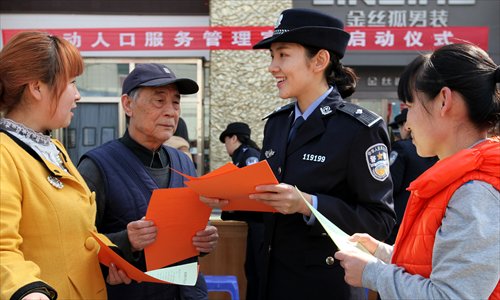HOME >> CHINA
Managing migrants
Source:Xinhua Published: 2015-12-16 23:08:01
New benefits mean clearer future for millions of rural hukou holders

A police officer in Zaozhuang, Shandong Province distributes leaflets that teach residents how to apply for a residence permit in March. Photos: IC
Despite living and working in Beijing for 10 years, the city's doctors are still inaccessible to Hebei Province-native Liu Yushun.
Without a Beijing residence permit or hukou, seeing a doctor in the capital is too pricey for the 35-year-old.
"We only have rural medical insurance, and can't afford to see a doctor here. I just take vitamins to avoid getting sick," he said.
But a new national policy announced Saturday could soon change Liu's life, along with hundreds of millions of other migrant workers across the country.
The new regulation, effective from January 1, 2016, requires every city in China to offer a baseline of public services, mainly healthcare, for migrant workers who have lived in the city for at least six months and either have a stable job, a place to live or are studying. Previously, such benefits were determined at the local level.
The policy, which clarifies that residence permits can be converted into hukou, also puts the country on track to achieving its ambitious goal of granting 100 million rural migrants urban hukou.
Unlike a residence permit, which is granted after migrant workers are approved to live and work in a city, the much coveted hukou means the holder is a permanent resident of the city that issues it and gives them full access to a range of social benefits.
Wide coverage
China's cities are home to 250 million migrants, mainly from rural areas. As they do not hold a city hukou, they are denied full access to social welfare.
Many local governments have been experimenting with their own residence permit systems for years, however, results have been varied.
The new rule will push local governments to lower the threshold for permits and offer more services, while eliminating irregularities in implementation, said Ni Pengfei, an urban development researcher with the Chinese Academy of Social Sciences (CASS).
Beijing has issued residence permits that give the bearers access to social benefits similar to those received by local hukou holders since 2003, however, obtaining the benefits has proven to be difficult as they are reserved for individuals who have made extraordinary contributions or are classified as urgently needed talent.
Like the majority of migrant workers in Beijing, Liu, a driver for taxi-hailing company Didi Dache, was not qualified for a permit.
As he is a freelance worker, he was also exempt from some of the newer programs providing social benefits to migrant workers with stable jobs.
Still, many have doubts about the effectiveness of the national policy. While it requires every city to provide basic benefits, it also allows each city to determine the specific benefits on offer, such as housing policies or whether children of permit holders can take the national college entrance exams.
Though the new system could provide him access to basic health care, Liu's children are still likely to have to travel back to Hebei to take the key exam.
"Given the different conditions in different cities, a 'onesize fits all' policy is impossible. But the basic principles of the national rule must be followed," Ni said.
While the new policy stipulates that towns and small cities with a population of no more than 500,000 should grant hukou to migrants as long as they have legal and stable accommodation, for overcrowded cities like Beijing, it is more complicated. The capital will establish a score-based system, which takes into account employment, how long applicants have paid into social insurance schemes, housing situation, among other factors, to determine who can get a hukou.
New buyers
The migration campaign is not only aiming to improve social justice, it also could help lift domestic consumption by unleashing migrant workers' spending power in China's sluggish property market.
This year, Premier Li Keqiang called for hukou reforms to boost house sales. During a meeting on the economy on Monday, the government reiterated this strategy, calling for the transformation of migrant workers into home-owning urbanites. Only about 1 percent of China's migrant workers own a home in cities, signaling huge untapped potential, said Li Guoxiang, a rural development researcher with CASS.
The housing market saw a downturn in 2014 due to weak demand and a supply glut. The trend continued in 2015, which resulted in easing measures such as interest rate cuts, reducing down payments and scrapping home-purchase restrictions.
Posted in: Society